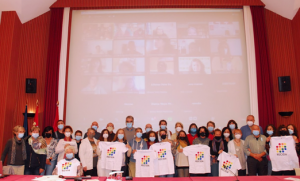In the leadup to COP26, IFLA asked the Standing Committee of the Environment Sustainability and Libraries Section (ENSULIB) to share examples of libraries educating, connecting and empowering their communities to take climate action.
Below is an article contributed by Rosario Toril Moreno, Documentalist at the National Center of Environmental Education, to give insight into some actions of the Spanish Network of Green Libraries (RECIDA).
 From 20 to 22 October 2021, the twentieth Seminar of Environmental Documentation Centers and Protected Natural Areas was held. This year it has been coordinated by the National Center for Environmental Education (CENEAM) of the Ministry for the Ecological Transition and the Demographic Challenge and the Center for Documentation and Resources for Environmental Education of Cantabria (CIMA).
From 20 to 22 October 2021, the twentieth Seminar of Environmental Documentation Centers and Protected Natural Areas was held. This year it has been coordinated by the National Center for Environmental Education (CENEAM) of the Ministry for the Ecological Transition and the Demographic Challenge and the Center for Documentation and Resources for Environmental Education of Cantabria (CIMA).
After the COVID-19 pandemic, we resumed our in-person annual meeting in Valsaín, Segovia (Spain).This year, it has also been possible to attend the meeting online, since, for the first time, it has been held in a hybrid way. Ninety participants were registered, among whom were heads of centers, experts and professors from universities in the seventeen regions of Spain and thirteen national parks, in addition to other natural areas.

On the days when the Seminar was held, the heads of the institutions represented (state, regional, universities, research, natural spaces and NGOs), told us their news and experiences in the different cases and settings, as well as their collaboration and exchanges through the RECIDA network.
We began the meeting with Petra Hauke, Secretary of IFLA’s Environment, Sustainability and Libraries Section (ENSULIB), who informed us of its organization and activities, as well as of the German Green Library Network, of which she is a co-founder.
RECIDA, the network of green libraries, which has been working for sustainability for 20 years, was present at COP25 in Madrid with a stand in the green area. In the RECIDA’s Action Plan is to keep carrying out actions to raise awareness and mitigate climate changes and reach the Sustainable Development Goals (SDGs).
In this area, we can highlight experiences such as:
- Reading Clubs in environmental information centers that allow citizens to bring environmental readings closer to the public and raise awareness of the climate emergency
- Parks and libraries, which raises the need of awareness and education for the better preservation of surrounding natural and cultural heritage within the framework of the public library and natural parks
- Literary Ecomenu, which encourages users to read, gaze, feel and marvel at nature through words and books. Reading and nature linked in a restaurant menu card.
- Resources for a sustainable diet
- Educational materials for eco-social education aimed at solving social, economic and ecological problems
- Application of nature-based solutions for local adaptation of educational and social buildings to climate change
- Environmental education in waste management
- Interviews on YouTube for the dissemination of books and environmental projects that sensitize all citizens
- The creation of a Climate Library
- Natural Areas Conservation Experiences
- The 2030 School Agenda based on the SDGs, the purpose of which is to develop skills, knowledge, attitudes, motivation and commitments to take part in the eco-social transformation.
We also got to know the magazine “Salvaje” thanks of its director. This publication focuses on the natural and rural values, giving voice to the new initiatives that are revitalizing the rural environment. And we participated in the live broadcast of the videoblog on Twitch “En plan Planeta: Educación Ambiental en la trinchera”.
Representatives of some of our strategic alliances were also present, such as the Association of Environmental Journalists (APIA), which deals with accurate reporting, IAIA with its SDGs wool books. These books are made by elderly, people with mental illness, intellectual disabilities or women in prison. These stories are used in educational centers and libraries in environmental awareness workshops (Bees, Climate change, Wool), so that children learn through experiences with wool; Teachers for Future Spain with its Plan 28,000 for the climate, or The International Network of SDGs Promoters with its awareness, dissemination, communication and promotion actions of the SDGs aiming at social transformation and citizen participation.
We learned free access information sources to use on social networks, as well as how the digital magazine “Actualidad Jurídico Ambiental” is managed; the news of the updating of the ISBD standard for the bibliographic description; and about the environmental bibliographic resources of the Ministry of Defense.
Workshops on content creation with light metadata, a first contact with Scimago Graphica and how to make tables that represent communicative efficiency in the visualization of data. The exchange of ideas in the working groups and the new commitments for the next Action Plan closed this meeting.
It should be noted that the presentations made have shown the optimal use of RECIDA resources on the Internet and the ability of managers to innovate in difficult situations either because of the pandemic or because of the limited resources, developing methodologies and using technology in the most efficient way possible, always with the aim of giving the best support to environmental education and promoting the best use of the natural resources of our environment and the planet.